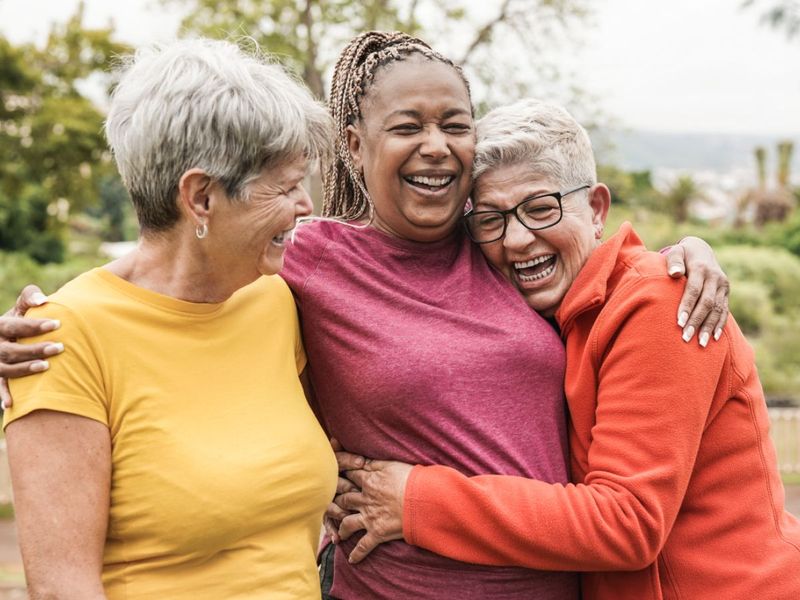20 Reasons End Of My Bad Marriage Was The Beginning Of The ‘Real’ Me
In a relationship where I slowly lost myself, the end of my bad marriage marked the beginning of finding my true identity.
The journey back to my authentic self was both challenging and liberating. Here are 20 reasons why the end of my marriage was the start of uncovering the real me.
1. I Stopped Walking on Eggshells

The constant tension of not knowing what might trigger a conflict was exhausting. I found myself tiptoeing around, trying to keep the peace, but in doing so, I lost my voice. Once my marriage ended, I could finally walk in my truth without fear of upsetting someone else.
This newfound freedom allowed me to speak my mind and express my feelings honestly. I realized that my opinions mattered, and I had every right to be heard. Walking without the fear of cracking eggshells made me feel lighter and more in control of my life.
The liberation was palpable, like a weight lifting off my shoulders. It was a powerful reminder that living authentically was not only empowering but necessary for my mental and emotional well-being.
2. I Could Finally Breathe in My Own Home

My home, once a place of tension, became a sanctuary of peace. The silence that used to signal impending arguments transformed into a comforting quiet. I no longer held my breath, anticipating the next bout of hostility.
Breathing deeply, I found solace in my own space. The air felt fresher, and my lungs filled with a sense of calm I hadn’t experienced in years. This change was not just physical; it was emotional. I was reclaiming my environment and making it my own.
Decorating and arranging my space to reflect my tastes infused my home with warmth and comfort. Each breath in this transformed environment was a step toward healing and self-discovery, reminding me that I deserved a place that felt like home.
3. I Stopped Asking for Permission to Be Myself

In my marriage, I often felt the need to seek approval for my choices, even those about my own identity. The end of that relationship marked a turning point; I no longer needed someone else’s endorsement to be myself.
This newfound autonomy allowed me to explore parts of myself I had long suppressed. I rediscovered interests that had been buried and dared to express my individuality without fear. It was exhilarating to make decisions that were wholly mine.
Embracing who I truly am felt like painting a blank canvas with vibrant colors. Every stroke was an affirmation of my worth and uniqueness. I learned that authenticity is a gift I owe to myself, and living shamelessly in my truth became a daily practice.
4. I Laughed Again—and Meant It

Laughter had become a scarce commodity in my life, often masked by forced smiles and hollow chuckles. After my marriage ended, genuine joy found its way back into my world. I laughed, not because it was expected, but because it was real.
Surrounded by friends who embraced and uplifted me, I rediscovered the healing power of laughter. It echoed the freedom I felt inside, unburdened by the judgments that once clouded my happiness. Joy returned when criticism left.
Every laugh was a celebration of my new reality. It was a testament to resilience and the ability to find light even after the darkest times. This unrestrained mirth was more than just happiness; it was a reminder of the vibrant person I was always meant to be.
5. I Reconnected with Friends I’d Quietly Pushed Away

Isolation had been a silent thief in my marriage, gradually distancing me from those who mattered. The end of that chapter was a golden opportunity to rekindle these precious connections. Reaching out to old friends felt like opening a window to let fresh air into a stagnant room.
Our laughter-filled reunions reminded me of the bonds that had always supported me. I realized that true friendships are resilient, enduring despite time and distance. Reconnecting with these loved ones was like finding missing pieces of myself.
Each conversation, hug, and shared memory was a step toward healing. I understood that love should connect, not isolate. These friendships became an anchor, grounding me as I navigated the new waters of my life.
6. I Started Sleeping Through the Night Without Anxiety

For years, my nights were plagued by anxiety, robbing me of rest and peace. The end of my marriage was also the end of sleepless nights filled with worry and fear. I began to sleep deeply, enveloped in the comfort of newfound tranquility.
The absence of constant stress allowed my mind to relax. As anxiety ebbed, restful nights replaced the tension that had once knotted my thoughts. This shift was not only about physical rest, but also about reclaiming mental peace.
Waking up refreshed and without a knot in my stomach was liberating. It was a reminder that my well-being was worth prioritizing. Each night of peaceful sleep was a testament to the healing power of letting go of what no longer served me.
7. I Made Decisions Without Second-Guessing Myself

In my marriage, second-guessing became second nature. Every decision felt like walking a tightrope, fearing missteps. But post-divorce, I found the courage to trust my judgment without the shadow of doubt looming overhead.
Making choices became an empowering experience. I learned to rely on my instincts, which had been silenced for too long. Each decision, whether big or small, was a step toward reclaiming my autonomy and confidence.
This newfound decisiveness was liberating. It allowed me to forge a path that authentically reflected my desires and aspirations. I realized that trusting myself was a crucial part of my personal growth and journey to self-discovery.
8. I Stopped Apologizing for Everything

Apologizing had become a reflex, a way to keep the peace and avoid conflict. However, post-divorce, I understood that my existence didn’t need constant justification. It was time to stop saying “sorry” for being who I am.
Embracing my right to occupy space and voice my feelings was transformative. I realized I didn’t need to apologize for taking up space, having opinions, or for my emotions. This shift was empowering, allowing me to step into my own with assurance.
Living unapologetically was not about disregarding others, but about claiming my right to be. It was freeing to express myself without the weight of unnecessary apologies. I learned that my presence was enough, and I deserved to be here without apology.
9. I Rediscovered Hobbies I Thought I’d Outgrown

Once buried under the weight of a stifling marriage, my passions reemerged with newfound vigor. I revisited hobbies I thought I’d outgrown, only to discover they were essential parts of my true self waiting to be revived.
Engaging in these activities was like meeting old friends. Whether it was painting, playing an instrument, or gardening, each hobby became a joyful expression of my rediscovered identity. They were not mere pastimes, but lifelines to my authentic self.
These pursuits ignited a spark within me, illuminating paths to happiness and self-fulfillment. I realized that my interests were valid and that nurturing them was an act of self-love. Through this rediscovery, I reconnected with the vibrant and creative person I truly am.
10. I Stopped Confusing Survival with Love

Love, I learned, should not feel like merely holding on for dear life. In my marriage, survival often masqueraded as love, keeping me trapped in an unhealthy cycle. Finally stepping away allowed me to see the distinction clearly.
I realized that love should be nourishing, not depleting. It should feel like home, not a battleground. This revelation was both startling and liberating, opening my eyes to what genuine affection and partnership should embody.
Understanding the difference between survival and love was pivotal in redefining my relationships going forward. It taught me to value authentic connections that empower rather than imprison. Love became an invitation to flourish, not a command to endure.
11. I Found Out I Wasn’t “Too Sensitive”—I Was Just Unheard

Throughout my marriage, I was often told I was “too sensitive,” a label that made me doubt the validity of my feelings. But in reality, my sensitivity was not a flaw, just a sign that I was not being heard or understood.
Once I stepped away from that environment, I embraced my emotions with pride. I understood that sensitivity was a strength, an ability to feel deeply and connect with others authentically. It was about time I honored this aspect of myself.
Embracing my sensitivity allowed me to connect with others on a deeper level, fostering relationships built on mutual understanding and respect. I learned that my feelings were always valid and deserved acknowledgment, allowing me to heal and grow.
12. I Learned What Actual Emotional Safety Feels Like

Emotional safety became a foreign concept in my marriage, replaced by constant tension and unease. Leaving that environment was my first step toward discovering what genuine emotional security feels like.
In relationships post-divorce, I found a new sense of safety—one where I could express my thoughts and feelings without fear of judgment or retaliation. This security fostered a space for vulnerability and authenticity.
Experiencing true emotional safety was transformative. It was a gentle reminder that healthy connections nurture, allowing both individuals to grow. I vowed never to settle for less, understanding that this was the foundation of any meaningful relationship.
13. I Made My Space Look and Feel Like Me Again

During my marriage, my living space had become a reflection of compromise, lacking personal touch. But after, I took the opportunity to infuse my environment with my essence, creating a space that resonated with who I truly am.
I decorated with colors and items that brought me joy, allowing my home to tell my story. This transformation was not just aesthetic; it was about reclaiming my identity and expressing it openly.
My surroundings began to mirror the inner transformation I was undergoing. It was a joy to live in a place that reflected my tastes and preferences, affirming my journey back to my true self. No longer erased from the walls, my spirit filled every corner.
14. I Started Taking Care of My Body with Care, Not Shame

Shame often overshadowed my self-care during my marriage, turning what should be nurturing into a chore. Post-divorce, I began treating my body with kindness, shifting the focus to self-love and acceptance.
I embraced practices that honored my body, like yoga and balanced nutrition. These acts of care were not about changing who I was, but celebrating and nurturing myself holistically.
This shift in mindset transformed my relationship with my body. It became a temple to be cherished, not criticized. Caring for myself was a daily affirmation that I was worthy of love and tenderness—a profound step in my healing journey.
15. I Cried Without Trying to Hide It

Tears were once a sign of weakness in my marriage, something to be hidden or apologized for. But after leaving, I found the strength in vulnerability, allowing myself to cry openly without shame.
Crying became a release, a way to cleanse my soul of the pain and fears that had accumulated. It was not a sign of defeat but an expression of humanity, enabling me to heal and move forward.
Embracing my tears as a natural part of my emotional spectrum was liberating. It taught me that it’s okay to feel deeply and that expressing those feelings was an essential step toward recovery and self-acceptance.
16. I Stopped Checking His Mood Before Checking My Own

Before, my day often revolved around gauging my partner’s mood, leaving little room to acknowledge my own feelings. Free from that cycle, I began prioritizing my emotions, which was both revolutionary and healing.
I learned to check in with myself first, honoring my feelings and needs before anyone else’s. This shift allowed me to cultivate a deeper understanding of my emotions, paving the way for genuine self-care.
Prioritizing my emotional health was a vital step in reclaiming my autonomy. It was a reminder that my feelings were valid and deserving of attention, setting a foundation for healthier future relationships.
17. I Realized I Was Never Asking for Too Much—Just from the Wrong Person

In my marriage, I was often made to feel like my needs were excessive. But stepping away revealed that I wasn’t demanding too much—my requests were simply misaligned with the wrong partner.
I learned that my standards weren’t the problem; the issue was trying to fit them into a relationship that couldn’t accommodate them. This realization was empowering, reinforcing the belief that I deserved to have my needs met.
Understanding that I wasn’t asking for too much allowed me to seek connections that valued and respected my desires. It taught me to hold onto my standards with confidence, knowing they were a reflection of my worth.
18. I Became a Better Parent When I Stopped Being a Worse Partner

Parenting under the strain of a failing marriage often left me depleted, unable to fully engage with my children. Ending the marriage lifted a weight, allowing me to be present and attentive.
With the emotional turmoil behind me, I found joy in parenting again. I could focus on nurturing my kids, providing them with the love and attention they deserved. This change was profound for both me and them.
Being a better parent was a direct result of becoming a better version of myself. The freedom to be authentic reflected positively in my relationship with my children, teaching them the importance of self-love and integrity.
19. I Redefined What Love Is Supposed to Feel Like

Leaving my marriage allowed me to redefine my understanding of love. What I once thought was love turned out to be a mere shadow of its true form, clouded by fear and sacrifice.
I learned that love should feel like ease, not conflict. It should be a partnership where both individuals grow and thrive. This redefinition was crucial in seeking healthier, more fulfilling connections.
Love, as I now understand it, is about mutual respect and support, not compromise of self. This insight reshaped my perspective on relationships, guiding me toward a future where love is a source of strength, not a burden.
20. I Met the Version of Me I Buried to Keep the Marriage Alive

Subsumed by the demands of a failing marriage, I lost sight of who I truly was. But stepping away allowed me to meet the vibrant, authentic self I had buried.
Reacquainting myself was a journey of discovery. I reconnected with my dreams, values, and passions that had been sidelined. It was empowering to reclaim my identity and live in alignment with my true self.
Meeting this version of me was both a homecoming and a revelation. It affirmed that I was worthy of being seen and celebrated for who I am, not who I was expected to be. She’s not leaving again.







